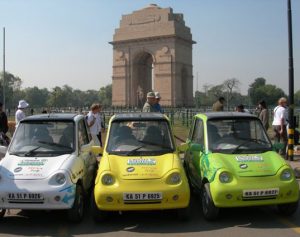” Most of developed giants are switching to electric vehicles, is that possible for India right now or not, CEV ex-cogitated on this agenda on Friday, 25 August.”
The purpose was to discuss the advent of electric vehicle (EVs), and its impact in future.
The following points supported the introduction of EVs in Indian markets:
- Electric vehicles are paving their way to roads at an impressive pace in many developed countries like USA, China, etc.
- Considering the emission from gasoline and electricity produced for EVs (no exhaust) gasoline vehicles cause far more havoc to earth’s air, thus EVs have a potential to construct a transportation system that can mitigate the climate changes by lowering the GHGs emissions.
- If we talk in terms of efficiency EVs stand far ahead of gasolines with average around 90%, whereas internal combustion engines are as efficient as 40%, from consumer point of view.
- EVs introduction in India can help cut down petroleum products imports and hence will make India more self reliant.
- Moreover in coming years petrol and diesel prices are going to boost up hence switching to EVs would be economical for individual also.
- EVs with them also bring a promising source of income to huge section and a great possibilities of startups in India.
- Recycling batteries is considered a curse for this industry but it could be a whole new industry in itself.
- Launching the EVs in public transport an help gain consumer acceptance thus can boost private vehicles market, also implementation in public transport is easy with minimum resources like charging points at fixed stops only.
- Government as well as private companies are also taking interest in EVs, like TATA, Ashok Leyland, Aether Energy (indigenous two-wheeler manufacturing startup), Mahindra and Mahindra Motors all are putting efforts to make EVs less costlier and convenient for Indian consumers.
The following points were there which indicated that though a potential tool to fight global warming yet for India it is not possible to implement now:
- As the number of EVs increase, the electricity supply demand will boost rapidly and it would be difficult to set up new power stations at that rate.
- Infrastructure is another one of most biggest obstacle. New manufacturing factories, service centers, new charging stations, etc all this will cost a huge. Moreover, casual mechanics will also needed to be trained to be able to repair the new electric automobiles.
- The battery on which EVs operate are not easily recyclable and its disposal is also threatening for environment.
- India’s lithium reserve are surely not sufficient to cater the increasing demand hence for batteries we will have to depend on other countries.
- Technical limitation like more charging time, low operating time, low range, low speed, less safety, etc are set backs for EVs.
- Awareness in India among common public is also big challenge, on the other hand social stigma and skepticism are also existing like people in Delhi don’t prefer e-rickshaw because it appears cheap and uncomfortable to travel in them. So work is also needed to be done on asthetics.
- Many startups in past few years failed as the cost of EVs are much more than gasoline vehicles.
- Most of the problems related to EVs need a technical approach to be solved but in India research is not that much acknowledged and encouraged.
Conclusion:
India right now can not choose to switch to electric vehicles, but surely it is on a right track to achieve a sustainable transportation system. But to reach there we whole as a country have to put efforts, government need to come with scheme like FAME INDIA, new policies that encourage public to go for electric car even if they cost little higher. Along with this marketing is another prospect to focus upon, promotion of these cars by celebrities to break the social stigma. Hybrid cars can also act as transient stage between gasoline to electric cars. Participation by Indian students in technical events like FORMULA STUDENT must be appreciated so that the answers to technical problems can be produced from Indian engineering colleges. Along with these the oil companies should be supported by government to provide their petrol pumps with electric vehicles charging services also. Gasoline vehicles manufacturing companies should be motivated to convert ICs cars to electric ones.
Then only we can move in era where in India problems like poor air quality, energy insecurities, dependence on other nations no longer exists.
Minutes by:
Rahul, Electrical engineering (2nd year), SVNIT.

